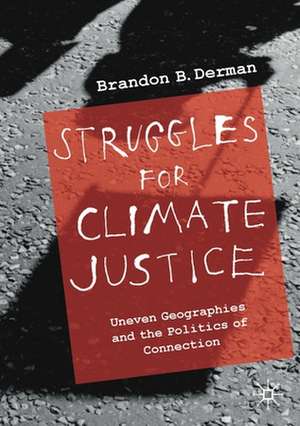Struggles for Climate Justice: Uneven Geographies and the Politics of Connection
Autor Brandon Barclay Dermanen Limba Engleză Paperback – 15 mar 2020
Deploying relational understandings of nature-society, space, and power, Brandon Derman shows that climate change has been co-produced with social inequality. Mismatching levels of responsibility and vulnerability, and institutions that emerged in tandem with those disproportionalities compose the terrain on which NGOs and social movements now contest climate injustice in a wide-ranging “politics of connection.” Case-based chapters explore the defining commitments of affected and allied communities, and how they have shaped specific struggles mobilizing human rights, international treaties, transnational activist forums, national and local constituencies, and broad-based demonstrations. Derman synthesizes these cases and similar efforts across the globe to identify and explore crosscutting themes in climate justice politics as well as the opportunities and dilemmas facing advocates and activists, and those who would ally with them going forward.
How should we understand campaigns for climate justice? What do these initiatives share, and what differentiates them? What, in fact, does “climate justice” mean in these contexts? And what do the framing and progression of such efforts in different settings suggest about the broader conditions that produce and sustain climate injustice, how those conditions could be unmade, and what might take their place? Struggles for Climate Justice approaches these questions from an interdisciplinary perspective accessible to graduate and advanced undergraduate students as well as scholars of geography, social movements, environmental politics, policy, and socio-legal studies.
Preț: 496.80 lei
Preț vechi: 584.47 lei
-15% Nou
Puncte Express: 745
Preț estimativ în valută:
95.08€ • 98.22$ • 79.13£
95.08€ • 98.22$ • 79.13£
Carte tipărită la comandă
Livrare economică 26 martie-09 aprilie
Preluare comenzi: 021 569.72.76
Specificații
ISBN-13: 9783030279646
ISBN-10: 3030279642
Pagini: 279
Ilustrații: XXIX, 261 p. 9 illus., 8 illus. in color.
Dimensiuni: 148 x 210 mm
Greutate: 0.35 kg
Ediția:1st ed. 2020
Editura: Springer International Publishing
Colecția Palgrave Macmillan
Locul publicării:Cham, Switzerland
ISBN-10: 3030279642
Pagini: 279
Ilustrații: XXIX, 261 p. 9 illus., 8 illus. in color.
Dimensiuni: 148 x 210 mm
Greutate: 0.35 kg
Ediția:1st ed. 2020
Editura: Springer International Publishing
Colecția Palgrave Macmillan
Locul publicării:Cham, Switzerland
Cuprins
Introduction.- Chapter 1: Producing and Contesting Climate Injustice.- Part I: International Laws and Institutions.- Chapter 2: Climate Wrongs and Human Rights.- Chapter 3: Law, Power, and the COPs.- Part II: Transnationalism and Grounding.- Chapter 4: On the Outside.- Chapter 5: Grounding Climate Justice.- Chapter 6: Mapping the Politics of Connection.
Recenzii
“This book is set to become a foundational tool for climate justice policy advocates and local leaders in marginalized communities, as well as students and scholars of environmental studies, geography, social movements, and public international law.” (Hélène B. Ducros, EuropeNow, europenowjournal.org, June, 2020)
Notă biografică
Brandon Barclay Derman is Assistant Professor in Environmental Studies at the University of Illinois Springfield, USA. He researches and teaches in the areas of environmental and natural resource policy and politics, political ecology, socio-legal studies, and climate change. His recent work has appeared in the Annual Review of Law and Social Science, Climate Policy, the South African Journal on Human Rights, and edited volumes on climate change, justice, and global governance.
Textul de pe ultima copertă
This book provides an accessible but intellectually rigorous introduction to the global social movement for ‘climate justice’ and addresses the socially uneven consequences of anthropogenic climate change.
Deploying relational understandings of nature-society, space, and power, Brandon Derman shows that climate change has been co-produced with social inequality. Mismatching levels of responsibility and vulnerability, and institutions that emerged in tandem with those disproportionalities compose the terrain on which NGOs and social movements now contest climate injustice in a wide-ranging “politics of connection.” Case-based chapters explore the defining commitments of affected and allied communities, and how they have shaped specific struggles mobilizing human rights, international treaties, transnational activist forums, national and local constituencies, and broad-based demonstrations. Derman synthesizes these cases and similar efforts across the globeto identify and explore crosscutting themes in climate justice politics as well as the opportunities and dilemmas facing advocates and activists, and those who would ally with them going forward.
How should we understand campaigns for climate justice? What do these initiatives share, and what differentiates them? What, in fact, does “climate justice” mean in these contexts? And what do the framing and progression of such efforts in different settings suggest about the broader conditions that produce and sustain climate injustice, how those conditions could be unmade, and what might take their place? Struggles for Climate Justice approaches these questions from an interdisciplinary perspective accessible to graduate and advanced undergraduate students as well as scholars of geography, social movements, environmental politics, policy, and socio-legal studies.
Caracteristici
Explores the social movement for climate justice Discusses the links between climate change and social injustice Introduces the concept of a 'politics of connection'
